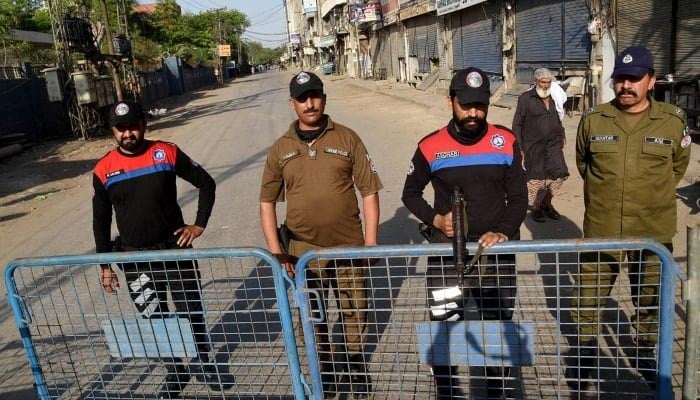
- Invoice tabled by Punjab Finance Minister Mujtaba Shuja-ur-Rehman.
- Regulation presently permits govt to impose Part 144 for max 2 days.
- Modification would empower DC to implement a ban for as much as 30 days.
LAHORE: The Punjab authorities offered an modification invoice within the provincial meeting which might permit the imposition of Part 144 for at least three months, The Information reported on Sunday.
Punjab Minister for Finance Mujtaba Shuja-ur-Rehman offered the Code of Legal Process (Punjab Modification) Act 2024, which seeks to amend the Code of Legal Process 1898, within the Punjab Meeting on September 5.
Presently, the legislation permits the provincial authorities to impose Part 144 for a most of two days, extendable to seven days, except there’s a risk to human life, well being, or security.
Nevertheless, the proposed modification would empower the deputy commissioner (DC) to implement a ban on public gatherings for as much as 30 days, whereas the secretary of the Residence Division might impose the ban for so long as 90 days.
The present legislation grants the ability to impose Part 144 to the workplace of the mayor (or zila nazim), who acts on a written suggestion from the police. The amendments, nonetheless, suggest transferring this authority to the deputy commissioner or the secretary of the Residence Division, whereas eradicating the requirement for a police suggestion.
Mujtaba, who tabled the invoice, informed The Information that the amendments had been launched after approval from the provincial cupboard. He stated that the interval of restriction beneath Part 144 has been prolonged as a result of “it’s neither fascinating nor practicable to hunt prior approval of the provincial cupboard every time such a ban must be imposed in any district of Punjab.”
“The proposed amendments have been launched to handle grave and emergent conditions which might be more likely to endanger public peace and order. They’re supposed to forestall imminent breaches of peace and supply a preventive jurisdiction and speedy treatment within the public curiosity,” the minister argued. For now, the invoice, has been referred to a committee of the Punjab Meeting.
It is usually essential to notice that violating Part 144 makes people accountable for prosecution, with penalties starting from one to 6 months’ imprisonment.
A 2022 report by the Human Rights Fee of Pakistan, titled “Freedom of Peaceable Meeting in Pakistan”, referred to Part 144 as an “unchecked authority”, enabling the provincial authorities and administration to “ban assemblies on just about any pretext for prolonged durations.”
The report famous that this energy had been “pervasively abused” by governments.
Saroop Ijaz, a lawyer and senior counsel Asia division for Human Rights Watch (HRW), has expressed issues in regards to the proposed adjustments to an already controversial legislation.
“The amendments will make an already dangerous legislation worse,” Ijaz informed The Information. “There have been calls [from human rights organizations and civil society] to repeal Part 144 within the CrPC, as it’s already overly broad. Now, this modification would permit the administration to impose restrictions for prolonged durations — as much as 30 or 90 days.”
Article 16 of Pakistan’s structure grants residents the suitable to peaceable meeting. But, critics argue that provincial governments have used Part 144 prior to now to forestall protests by farmers, college students, and even lecturers beneath the guise of sustaining “safety” and “legislation and order.” Not too long ago, the Punjab authorities has additionally invoked this part to ban political rallies by opposition events.
Ijaz added that the proposal by the Punjab authorities to switch the ability to impose Part 144 from the mayor or elected native authorities to the deputy commissioner or secretary of the Residence Division additionally seems to be an try by the provincial authorities to additional “centralise energy.”
Earlier this month, the federal authorities had hurriedly handed the Peaceable Meeting and Public Order Act 2024 which permits the administration within the capital metropolis to “regulate” and ban public gatherings. It additional elevated penalties for an “illegal meeting” from six months to a few years imprisonment.
